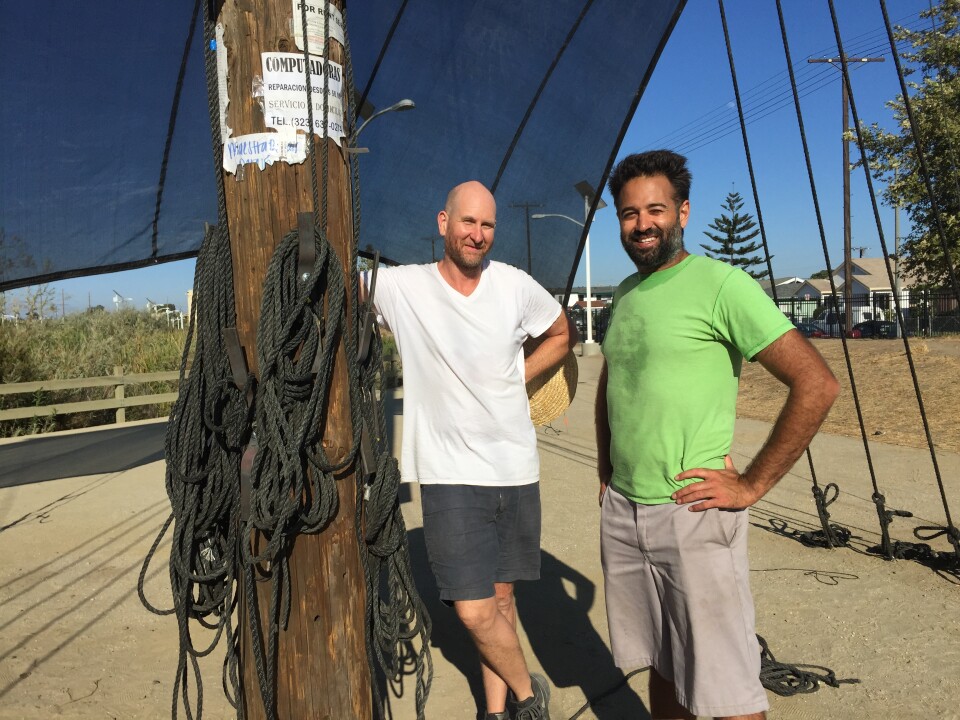This story is free to read because readers choose to support LAist. If you find value in independent local reporting, make a donation to power our newsroom today.
This archival content was originally written for and published on KPCC.org. Keep in mind that links and images may no longer work — and references may be outdated.
LA's new public art biennial wants to change the way you think about water
The first ever Los Angeles Public Art Biennial has opened. The theme for the inaugural event — called CURRENT:LA — is water. Not surprisingly, a lot of the performances, films, sculptures and installations have been situated near the ocean or along the L.A. River. But some biennial locations, like the South L.A. Wetlands Park, are far from either.
The park is tiny: just nine acres, right on a busy intersection at 54th and San Pedro in South Park, a dense, low-income, mostly Latino neighborhood. It’s also nowhere near a proper body of water – six miles from the L.A. River and 12 from the ocean.
Four years ago, this place was a polluted rail and bus yard. Now it’s a manmade marsh designed to filter stormwater before it’s flushed out to sea.
People can walk and jog on a dirt path around the wetlands, but it’s hard to figure out how to get in – there’s only one entrance, and the rest of the park is fenced off.
“The sanitation department is actually very diligent about it as a water treatment facility,” said artist Joshua Callaghan. “Its use as a park is a bit of byproduct that primary use.”
The park’s inaccessibility is one of the reasons Callaghan and fellow artist Daveed Kapoor chose the park for their sculpture, called Mast.

“Part of our idea was to create a beacon to tell people that this space is here,” Callaghan said.
In this case, the beacon is a ships’ mast made from an actual telephone pole. The artists built a crows nest and two schooner-sized sails, which double as shade tarps when unfurled.
Daveed Kapoor says just like the wetlands park transforms storm water, they wanted to transform something ordinary into something beautiful.
“It makes a profane thing, like this telephone pole, into something sacred,” he said.
Kapoor and Callaghan want the sculpture to blur the line between park and city street, utility pole and art. They want the confluence to draw people in.

“The cool thing about using a telephone pole as the structure is the neighborhood is full of telephone poles,” said Kapoor. “It just makes the inside and the outside contiguous.”
Making infrastructure beautiful — specifically, water infrastructure — was one of the ideas behind CURRENT:LA. Danielle Brazell, the city of Los Angeles’ director of cultural affairs, said growing up in L.A., she didn’t want to play in the river.
“When I was a kid we called it the wash, it was basically the sewer. And so there’s a whole new relationship of possibility to what the L.A. River could be,” she said.
Brazell urged Angelenos to think about water — where it comes from, how much we use, how we value it.
“We need water. We need to manage our water,” she said in a video promoting the biennial. “And we want to use every tool we have in our tool chest. And if creativity is one of those tools, let’s deploy it.
Some of the projects take Brazell literally: take the 51-minute experimental film that spends one minute on each mile of the L.A. River. Others are more abstract: how about a gelatinous sculpture made of bacteria found in the fermented drink kombucha. It’s meant to be a comment on social hierarchy. And then there are projects like Mast, which reference the role of water in California’s colonial history.
The mast is a model of the San Salvador, the ship that Spanish explorer Juan Rodriguez Cabrillo sailed to California in 1542.
“California was colonized by sea,” Kapoor said. “This ship, the San Salvador, is that image of first contact, of when Europeans took over.”
Kapoor and Callaghan say by reconstructing Cabrillo’s ship with contemporary materials like telephone poles, they are commandeering the ship and its symbolism for South L.A. The reference wasn’t lost on South Park resident Aylin Alcalá, who said it reminded her of a pirate ship, “but without the boat, just with the flags!”
Alcalá was wandering through the South L.A. Wetlands Park the Friday before the sculpture formally opened. But she wasn’t there necessarily to appreciate nature or admire public art — she was there to catch digital monsters on her phone. Yes, she was playing Pokemon Go.

“They usually spawn around parks, so yeah, it’s always a good place,” her brother, Luis Alcalá, said.
A few other kids playing Pokemon Go slowly walked by, heads down. Some of them said they’d never been to the South LA Wetlands Park until the game came out earlier this month. Kapoor said he didn’t mind if more people came to the park to play Pokemon Go than to look at their sculpture.
“Anything that’s getting people out into the streets, and into public spaces, that’s good,” he said.
If one of the goals of is to get people to appreciate the under-appreciated, they may have an unexpected ally in Pokemon Go.
CURRENT:LA continues through Aug. 14. Click here for locations and a schedule of events.











